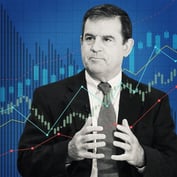“There are ways to make money on bad things. You just need to make the bet that they’re going to be bad.”
So says Ronald Surz, president of Target Date Solutions, in an interview with ThinkAdvisor.
Surz, for instance, is “betting against the market” with about $60,000 in his personal portfolio based on his forecast for a “50% loss” this year resulting from the continued deflation of the stock market’s superbubble.
In an uncommon view, he sees a stock market-induced recession on the way. Typically, the market is the leading indicator, not the reverse.
Though Surz has made the aforementioned bets against the market — which he details in the interview — most of his other personal investments are in Treasury bills and Treasury inflation-protected securities. That’s what he advises for viewers of “The Baby Boomer Investing Show” to protect their assets during this “perilous decade,” as he frames it.
Surz co-hosts the livestreamed education program, which premiered in 2020.
Right now is particularly perilous for baby boomers, he says, and in the interview, he provides three reasons for the “retirement crisis” U.S. consumers face.
With only modest savings and perhaps investments for safety — which reap low returns — boomer retirees “will find themselves [lowering] their standard of living,” he predicts.
For the last three years, Surz has been warning that boomers’ retirement is at risk. His book “Baby Boomer Investing in the Perilous Decade of the 2020s” details why, and what folks can do to avoid financial jeopardy.
Surz has managed target date funds for 401(k) plans since 2008. He developed the patented Safe Landing Glide Path as well as Soteria, software for record keepers to generate personal target date accounts.
He contends that the target date fund industry is coming up short in helping investors to a comfortable retirement.
For example, the typical 2020 fund was down 13% last year. Surz’s fund fell only 2%, he says.
ThinkAdvisor interviewed Surz on Jan. 9. He was speaking from his base in San Clemente, California.
Pulling no punches, he argues that “the investment management community” brainwashes people into “believing the future is bright,” and that “securities markets will always go up.”
Even analysts’ current pessimistic forecasts for 2023 are “optimistic,” he says.
Here are highlights of our conversation:
THINKADVISOR: You said on your show, “The Baby Boomer Investing Show,” that you’re ”betting against the market.” How are you doing that?
RONALD SURZ: There are ways to make money on bad things. You just need to make the bet that they’re going to be bad.
There are vehicles out there that basically bet against the stock market.
One is called Direxion Daily S&P 500 Bear 3X Shares ETF [SPXS].
It’s a triple-leveraged inverse bet that the market will go down. It’s currently at $25 a share. In June 2009, following the [plunge] in the stock market of 2008, SPXS was $130,000 per share.
What is it composed of specifically?
It’s engineered primarily with options. It’s risky — very volatile.
What else are you using to bet against the market?
Another one is Simplify Interest Rate Hedge ETF [PFIX].
It’s a leveraged bet that interest rates will go up. [This] was up 16% last year.
But most of our personal assets are safe in Treasury bills and TIPS — what we’ve been advising people to invest in.
[Ed. note: Surz confirmed Thursday he was still invested in SPXS and PFIX. "We remain worried," he said.]
Why Treasurys and TIPS?
We’ve been advising [our viewers] — baby boomers — to get safe with TIPS and Treasury bills because they’re getting older and won’t be living [that] much longer.
But then people [contact us] and say, “But there’s inflation — those [investments] aren’t going to be so good.”
What’s your response?
I really crank up the defense meter. One of the things you can do is buy a put option, but that comes with an expiration date, and it’s tricky.
And then there are the vehicles for betting against the market, [which I just discussed].
Why do you see more losses ahead for the markets: a 50% loss in stocks and a 30% loss in bonds, as you’ve said?
There has been a superbubble in the market. When superbubbles burst, they generally lose at least 40%, sometimes as much as 90%.
But all we lost last year was about 18%. So we’ve got a long way to go.
We’re in between historic losses and a bursting superbubble.
Last year’s correction started out really fierce, but by the end of the year, it reset. The market was going down around 18%, not a good year by any measure.
But certainly not the kind of correction that it will [take] to get the market back to reasonable price/earnings ratios, which have been astronomical.
And why do you forecast a 30% loss in bonds?
Right now, people think yields are going to come back down because they believe that the Fed will pivot. The number I’m hearing over and over is that we won’t see interest rates any higher than 5%.
The [critical] part about interest rates rising isn’t so much about the Fed raising the short end of the curve. [It's that] the Fed has stopped buying long-term bonds.
The interest rate for the 10-year Treasury is now at 4%. If it goes from 4% to 9%, there’s a 5 [percentage point] increase in interest rates.
[That's 3 percentage points] above inflation when inflation is 6%. Over the long term, bonds have yielded above inflation, when not manipulated.
Duration is now six [years]. The duration tells you what the change in price is when interest rates rise. Six times five is 30. That’s a 30% decrease in bond prices.
People typically say, “This time is different.” But you write, “This time really is different.” What are the top two reasons that lead you to call this a “perilous decade”?
One: We’ve never ever printed this much money as we have in the last decade: $5 trillion to $6 trillion. That was used to basically postpone the recession we probably would have had in 2008-2009.
The U.S. has spent more than any other country in the world on COVID, on a percentage of GDP basis. That’s another $6 trillion, $1 trillion of which went directly to us in checks and the rest used for vaccines and other [concerns].












 Copyright © 2024 ALM Global, LLC. All Rights Reserved.
Copyright © 2024 ALM Global, LLC. All Rights Reserved.